Physical Address
304 North Cardinal St.
Dorchester Center, MA 02124
Physical Address
304 North Cardinal St.
Dorchester Center, MA 02124
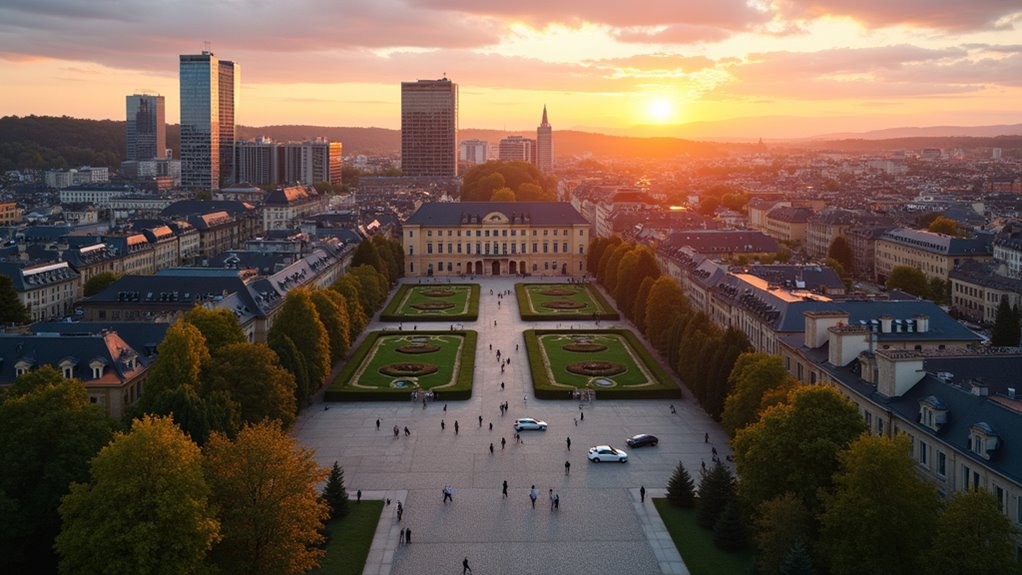
From financial powerhouse to space tech pioneer, Luxembourg's path to becoming the world's richest nation will surprise you.
Luxembourg tops global wealth rankings because you’ll find a perfect economic storm: a powerhouse financial sector managing €4.5 trillion in assets, strategic European location, and multilingual workforce—all benefiting just 650,000 residents. The nation’s business-friendly tax policies (corporate rates as low as 14%) and remarkable political stability attract global investment. Beyond banking, they’re diversifying into space technology, green finance, and digital innovation. The numbers tell an astonishing story of prosperity.
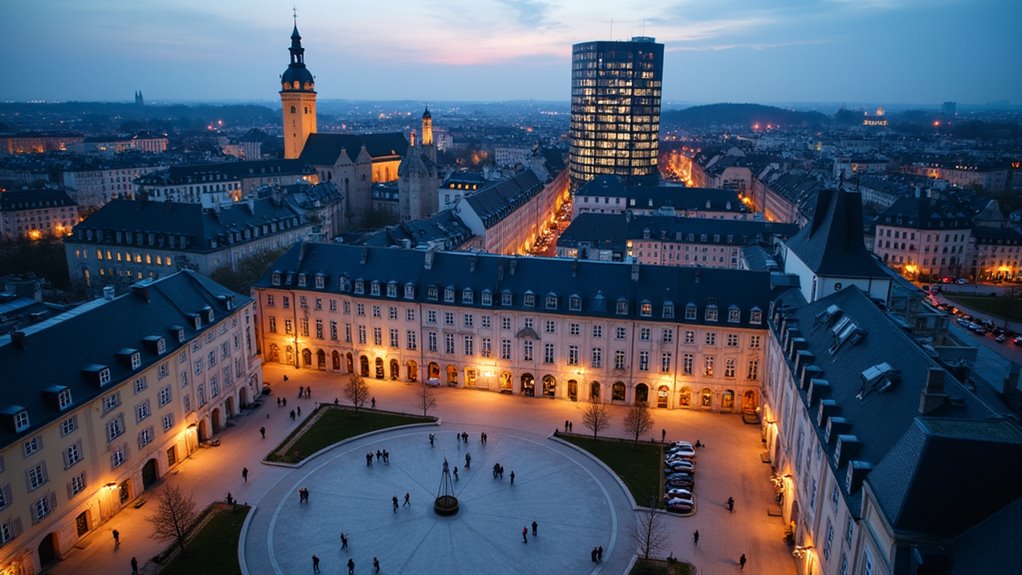
How does a tiny European nation wield such enormous financial clout? Look at the numbers! Luxembourg’s banking sector has exploded to nearly €987 billion as of March 2025, growing steadily month after month.
Luxembourg’s financial dominance defies its size, with a banking sector approaching €1 trillion and climbing rapidly.
You’ll find a thriving interbank market, with lending up 3.22% to €248 billion recently. That’s real money moving through real institutions!
Meanwhile, deposits have surged by a whopping 13.63% year-on-year, showing rock-solid confidence in the system.
While loans to corporations have dipped, specialized financial intermediaries are booming—up 17.16% yearly. That’s Luxembourg’s secret sauce: focusing on what they do best.
The country’s projected €3.37 billion in net interest income for 2025 proves they’ve found their niche in global finance. Luxembourg’s success can be attributed to its favorable regulatory environment that continues to attract international clients despite the country’s small size. Many wealthy individuals seeking holiday experiences are attracted to Luxembourg as one of Europe’s luxurious destinations while conducting business in this financial hub.
While many nations struggle to find their place on the global stage, Luxembourg’s location at the heart of Western Europe gives it an unbeatable head start! You’ll find this tiny powerhouse nestled between Belgium, Germany, and France—perfectly positioned to access major EU markets.
This strategic spot isn’t just good luck—it’s economic gold! Luxembourg’s robust transport infrastructure connects you seamlessly across Europe, whether by road, rail, or through its bustling cargo airport. The nation’s investment in high-speed fiber networks strengthens its position as a digital connectivity leader across the continent.
The country has transformed its central position into a competitive advantage, attracting businesses that need to operate cross-border efficiently. Unlike its Scandinavian neighbors to the north, Luxembourg benefits from shorter distances to multiple major economic centers.
With key EU institutions like the European Court of Justice calling Luxembourg home, you’re at the epicenter of European decision-making.
It’s not just where Luxembourg sits—it’s how they’ve leveraged every mile of their prime location!

When you peek beneath Luxembourg’s economic success, you’ll find its true superpower isn’t gold or oil—it’s people who speak multiple languages!
An astounding 83% of residents speak three or more languages, creating a workforce that’s uniquely equipped to serve international clients. You’ll notice this human capital advantage translates directly to euros—multilingual workers earn 5-20% higher wages than their monolingual counterparts.
Luxembourg’s workforce is remarkably diverse: about half commute daily from neighboring countries, while only 25% of workers are native Luxembourgers. This linguistic mosaic perfectly supports the country’s economic needs, from French-speaking financial analysts to Portuguese-fluent hospitality workers. This language versatility makes Luxembourg similar to popular Mediterranean destinations where multilingualism is also highly valued in tourism and business sectors.
Employers actively seek (and reward) these language skills, especially in customer-facing roles. According to ADEM Statistics, Luxembourg’s employment market consistently shows higher demand for candidates with multilingual capabilities.
This multilingual miracle isn’t accidental—it’s a carefully cultivated competitive advantage that keeps Luxembourg’s economy humming!
The secret sauce behind Luxembourg’s economic miracle isn’t just its multilingual workforce—it’s a tax system designed to make businesses feel right at home!
You’ll find corporate tax rates that keep dropping—now as low as 14% for smaller incomes and 16% for larger ones, with a combined effective rate of just 23.87% in Luxembourg City.
Need to hold investments? Luxembourg’s participation exemption completely eliminates taxes on qualifying dividends and capital gains.
Hold international investments worry-free with Luxembourg’s participation exemption—zero taxes on qualifying dividends and capital gains.
The country offers zero withholding taxes on outbound payments and maintains special advantages for everything from IP development to green finance initiatives.
While Denmark’s major cities offer significant cultural attractions, they can’t match Luxembourg’s exceptional tax benefits for international businesses.
Corporate entities benefit from equal application of tax policies regardless of their origin, creating a level playing field for all businesses based solely on residency status.
Even compliance is streamlined with simplified wealth tax calculations and transparent municipal rates.
It’s a system that maintains EU compliance while still rolling out the red carpet for global business.
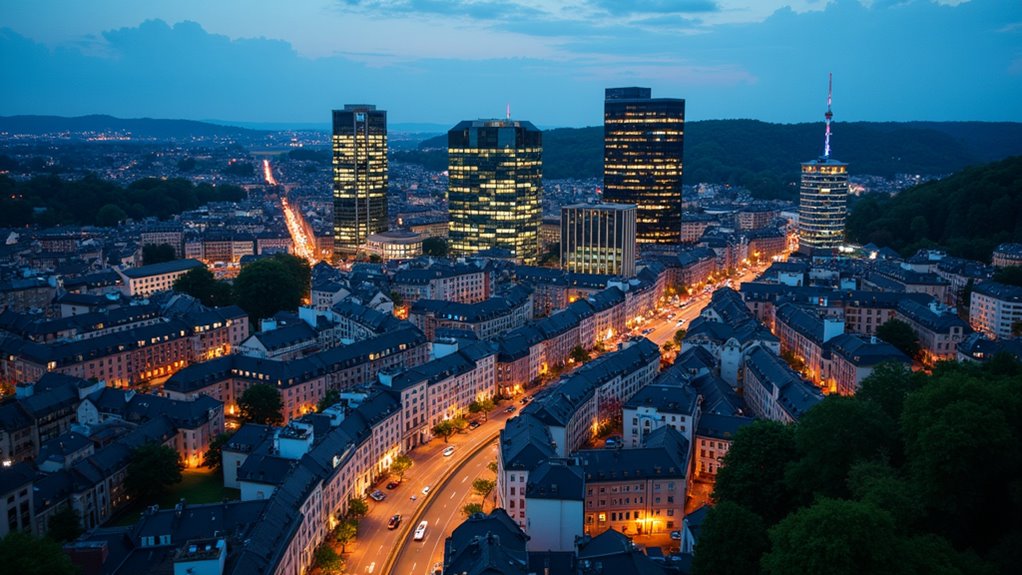
Luxembourg’s economic magic doesn’t stop with its tax benefits—it’s also built on a fascinating mathematical equation! When you divide massive economic output by just 650,000 residents, you get astronomical wealth per person.
This tiny nation achieves its outsized prosperity through:
The result? Luxembourg produces about $112,000 per worker—turning its small size into its greatest economic advantage. According to IMF projections, Luxembourg is expected to lead the world with GDP per capita of approximately $141,079.52 USD in 2025. Unlike party destinations in Cyprus that boost tourism revenue, Luxembourg focuses on high-value financial services to maintain its wealth.
While many nations struggle to attract global talent, Luxembourg has mastered a remarkable economic formula: tapping into a massive cross-border workforce without the infrastructure pressures of housing them.
Luxembourg’s economic genius lies in leveraging foreign talent without bearing the burden of domestic infrastructure expansion.
You’ll find that nearly half of Luxembourg’s workforce—a whopping 47%—commutes daily from France, Germany, and Belgium. These 230,000 cross-border workers bring specialized skills that fill critical gaps, particularly in digital fields like IT and cybersecurity. The largest contingent of these commuters comes from France with 126,000 workers crossing the border daily.
With median hourly wages of €24 (second highest in the EU), Luxembourg attracts top talent who enjoy the benefits without straining local housing or services. It’s brilliant! Companies get the expertise they need, workers earn excellent salaries, and Luxembourg maintains its competitive edge.
This approach is a key factor in Luxembourg’s status as the richest country in the world by GDP per capita. This flexible arrangement has become even more attractive with remote work options, letting Luxembourg harness foreign talent while keeping its small-country charm intact.
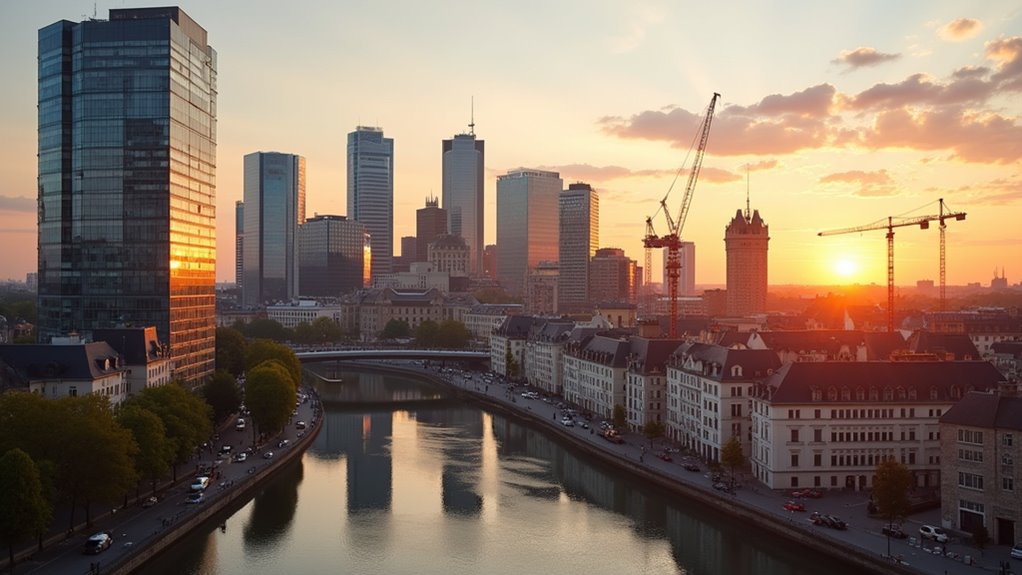
Why do multinational corporations consistently choose Luxembourg for their European operations? It’s simple – they’re drawn to Luxembourg’s rock-solid regulatory framework and unmatched political stability.
You’ll find Luxembourg’s financial sector protected by the Law of 5 April 1993 (LFS), which implements vital EU directives like CRD IV and V. The CSSF vigilantly oversees compliance, giving businesses confidence in the system. Luxembourg also attracts investors with a favorable tax environment and government grants that support business development. Unlike Nordic countries such as Norway and Finland, Luxembourg offers a more centralized European location with proximity to major financial centers.
What makes Luxembourg’s regulatory environment truly exceptional?
When you’re establishing financial operations in Europe, Luxembourg’s stability and regulatory excellence simply can’t be beat!
Beyond its stellar regulatory framework, you’ll find that Luxembourg has built a remarkably diverse economic ecosystem. While the financial sector still accounts for a hefty 25% of GDP, the country hasn’t put all its eggs in one basket.
Luxembourg’s economy shines beyond finance, with strategic diversification creating resilience most small nations can only dream of.
Since 2004, Luxembourg’s been aggressively diversifying into cutting-edge sectors. You’ll see pioneering initiatives like Spaceresources.lu—Europe’s first legal framework for asteroid mining—attracting space startups from across the globe.
They’ve launched the world’s first green exchange (LGX) for sustainable bonds too!
Their strategic push into ICT, logistics, space technology, biotechnology, and cleantech has paid off big time. Much like how Croatian cities differ in what they offer travelers, Luxembourg’s regions each contribute uniquely to its economic landscape. The Luxembourg Cluster Initiative has been instrumental in promoting growth across automotive, healthtech, cleantech, logistics, and manufacturing sectors. This smart diversification hasn’t just created a more robust economy; it’s positioned Luxembourg as a global leader in emerging industries—making their prosperity far more resilient than meets the eye.
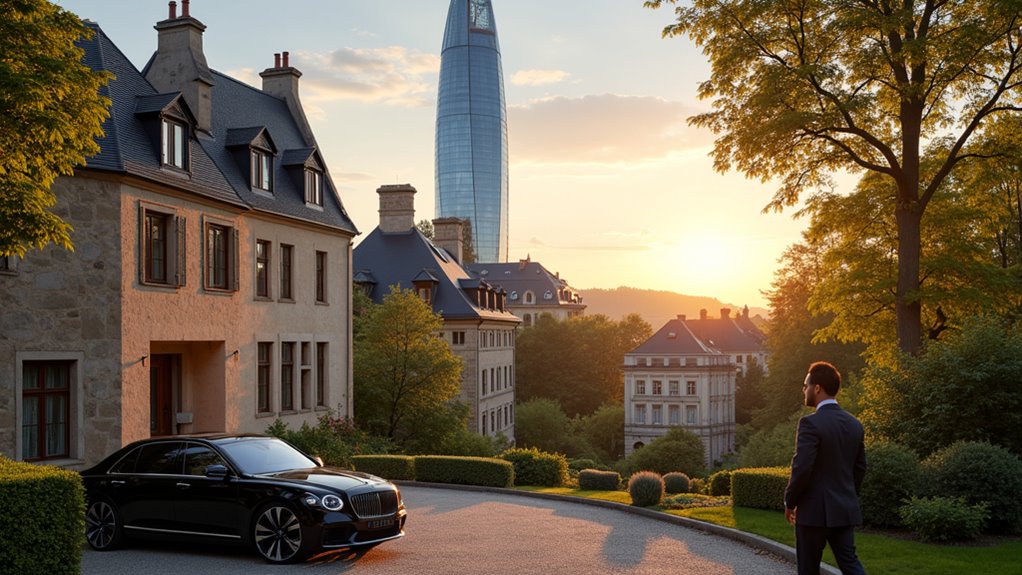
If you thought Luxembourg’s financial sector was impressive, you’ll be equally astonished by its dynamic housing market, which offers a fascinating window into the nation’s wealth distribution. The residential sector is projected to grow by 3.13% annually, with older houses increasing 3.5% in value last quarter.
Luxembourg’s real estate creates wealth through:
You’ll find older houses averaging €5,905 per m² while older apartments fetch €7,790 per m². Despite a recent loan volume decrease from €41.47 billion to €41.16 billion, the market shows promising recovery signs thanks to decreased interest rates and extended tax breaks—keeping Luxembourg’s property market resilient. However, household financial behavior reflects a cautious approach, as deposits increased by €131 million in early 2025 while housing loans declined. For those looking to experience Luxembourg’s prosperity firsthand, the country offers vibrant nightlife comparable to other wealthy European capitals, adding to its appeal for international professionals.
While Luxembourg’s housing market fortifies the nation’s wealth foundation, the country’s gaze is firmly set on the stars—literally. Since rejoining the European Space Agency in 2005, Luxembourg has rocketed into space prominence with over 80 companies employing 1,400 people in the sector! The government’s strategic vision actively promotes responsible space exploration that contributes to Earth’s sustainability while driving economic growth.
You’ll find Luxembourg isn’t just a one-trick pony. They’ve positioned themselves as Europe’s green finance hub, where sustainable investments and green bonds flourish. The regulatory environment is tailor-made for environmentally conscious investors looking to make an impact.
Digital innovation rounds out Luxembourg’s future-focused strategy. From AI to cybersecurity, they’re pouring resources into technological advancement while protecting data with iron-clad regulations.
It’s this perfect trifecta of space, green finance, and digital innovation that’s propelling Luxembourg’s wealth trajectory skyward.
You’ve seen how Luxembourg packs the economic punch of a heavyweight champion in a bantamweight frame! Its strategic location, savvy tax policies, and multilingual talent pool create a perfect storm of prosperity. While challenges exist, Luxembourg’s commitment to innovation and diversification means its golden goose will continue laying eggs for generations to come. The Grand Duchy isn’t just wealthy—it’s showing the world how it’s done!